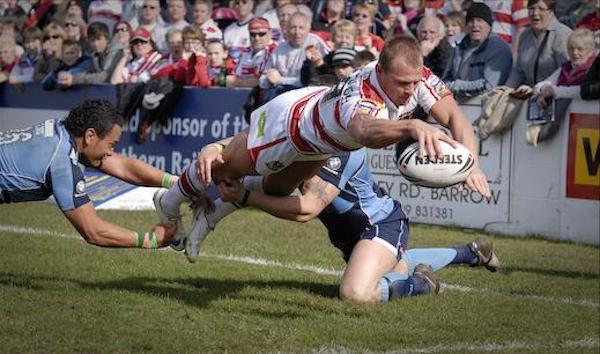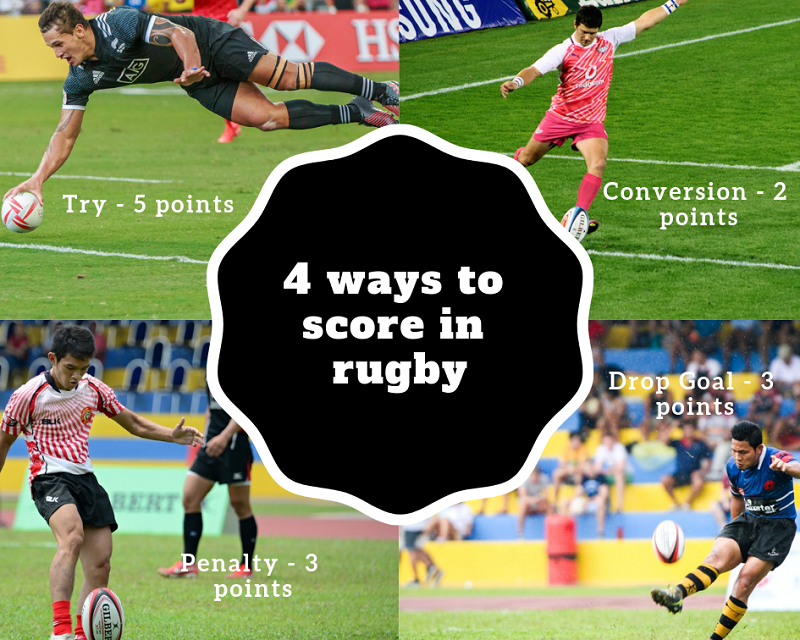Scoring in Rugby Union is both thrilling and strategic. It involves various methods and rules.
Rugby Union, a sport known for its intense physicality and teamwork, requires players to understand how to score effectively. Whether you are new to the game or looking to improve your skills, knowing the ways to score is crucial. From tries to conversions, each scoring method has its unique challenges and rewards.
In this guide, we will break down the different ways to score in Rugby Union. You’ll learn about the rules and techniques that can help you and your team succeed on the field. Understanding these fundamentals can enhance your enjoyment of the game and improve your performance. Get ready to dive into the exciting world of Rugby Union scoring!

Credit: www.youtube.com
Understanding Rugby Union Scoring
Rugby Union is a thrilling sport, and scoring can seem complex. But once you understand the basics, it becomes easier to follow. The scoring system in Rugby Union involves different types of scores, each with its own point value. In this section, we will break down the various ways to score and the points awarded for each.
Types Of Scores
There are several ways to score in Rugby Union. The main types include tries, conversions, penalty goals, and drop goals. Each type of score has its own unique method and significance in the game.
Try: This is the most common way to score. A player grounds the ball in the opponent’s in-goal area. It shows skill and teamwork.
Conversion: After a try, the team gets a chance to kick the ball through the goalposts. This adds extra points to the try.
Penalty Goal: Awarded when the opposing team commits a foul. The team can kick the ball through the goalposts from a place of their choosing.
Drop Goal: This is a kick made during open play. The player drops the ball and kicks it as it bounces off the ground. It requires precision and timing.
Point Values
Each type of score in Rugby Union has a specific point value. Understanding these values helps in following the game more closely.
Try: Worth 5 points. It is the most valuable type of score.
Conversion: Worth 2 points. It is a chance to add to the score after a try.
Penalty Goal: Worth 3 points. It rewards teams for exploiting opponents’ mistakes.
Drop Goal: Also worth 3 points. It can turn the tide in a tight match.

Credit: www.youtube.com
Effective Try-scoring Techniques
Scoring a try in Rugby Union involves skill and strategy. To become proficient, players must use various techniques. These techniques are crucial for breaking through the defense and reaching the try line. Below are some effective try-scoring techniques to enhance your game.
Running Lines
One of the most important techniques is to run smart lines. This means running at angles that challenge the defense. It involves changing direction and pace to create gaps.
- Diagonal Runs: Run diagonally to confuse defenders and find space.
- Switch Lines: Change your running line to exploit weak areas.
Practicing these running lines can make a big difference. It helps in breaking through the opposition’s defense.
Support Play
Supporting your teammates is another key technique. Good support play means being in the right place at the right time. This increases the chance of maintaining possession and scoring.
- Stay Close: Always be near the ball carrier.
- Anticipate: Predict where the play is going and move there.
Effective support play can turn a half-chance into a try. It requires awareness and quick decision-making.
Mastering Conversion Kicks
Mastering conversion kicks in Rugby Union can be a game-changer. A successful conversion kick can add two valuable points to your team’s score. Understanding the technique, angle, and distance is key to improving your conversion kicks.
Kicking Technique
Start with a proper stance. Place your non-kicking foot beside the ball. Keep it steady. Focus on your kicking leg. Swing it smoothly through the ball. Aim for the middle of the ball. Use the inside of your foot. Follow through with your kick. Keep your eyes on the ball.
Angle And Distance
Judge the angle of your kick. Place the ball at the right angle. Ensure you have a clear sight of the posts. The angle affects the trajectory. Adjust your stance based on the angle. Distance matters too. Know your kicking range. Practice from different distances. Build confidence in your ability to kick from various points on the field. Consistency is key.
Executing Penalty Kicks
Scoring a penalty kick in rugby union is a crucial skill. It requires focus, precision, and confidence. This section will guide you through the key steps in executing penalty kicks. Proper spot selection and mental preparation are vital.
Spot Selection
Choosing the right spot is essential. Find a flat, firm area on the field. This ensures stable footing and a clean kick. Avoid uneven or muddy spots. These can cause slips and misdirected kicks.
Consider the wind direction. Aim slightly to the side if the wind is strong. This helps the ball stay on course. Always keep these factors in mind for better accuracy.
Mental Preparation
Mental preparation is crucial for successful penalty kicks. Stay calm and focused. Breathe deeply to steady your nerves. Visualize the ball sailing through the posts. This boosts your confidence.
Block out distractions. Concentrate only on the ball and your target. A clear mind leads to a precise kick. Practice these techniques regularly. They will help you perform under pressure.
Scoring From Drop Goals
Scoring from drop goals is a unique and strategic way to earn points in Rugby Union. A successful drop goal can turn the tide of a game, rewarding the team with three valuable points. Understanding the timing, execution, and positioning on the field is crucial for achieving drop goals.
Timing And Execution
Timing is everything in a drop goal attempt. The player must decide quickly, often under pressure. A well-timed drop goal can catch the opposition off guard.
Execution involves the player dropping the ball to the ground and kicking it as it bounces back up. Precision is key. The player needs to align the ball correctly and strike it cleanly.
Practicing the technique regularly helps in mastering the execution. Players often use both feet to improve their versatility. A successful drop goal requires coordination, balance, and focus.
Positioning On The Field
Positioning on the field is critical for scoring from drop goals. The ideal spot is usually within the opponent’s 22-meter line.
Players must position themselves in a clear space, away from defenders. This provides a better angle for the kick.
Team communication is essential. Teammates must create space and protect the kicker from incoming tackles. The player must be aware of the wind direction and field conditions.
Below is a simple table summarizing key points:
| Aspect | Details |
|---|---|
| Timing | Quick decision-making under pressure |
| Execution | Drop the ball, kick as it bounces back up |
| Positioning | Within the 22-meter line, clear space |
By focusing on these aspects, players can improve their chances of scoring from drop goals. It’s a skill that can make a significant difference in a Rugby Union match.
Strategic Playmaking
Strategic playmaking is vital in Rugby Union. It involves planned moves and smart tactics to score points. Knowing how to execute these strategies can make a significant difference. Teams rely on different plays to break the opponent’s defense and gain an advantage.
Set Plays
Set plays are planned moves from a static position. They include scrums, lineouts, and restarts. These moments are crucial for gaining territory. Teams practice these plays to perfection. A well-executed scrum can push the opposition back. This creates space for attacking opportunities.
Lineouts are another key set play. The team in possession throws the ball in from the sideline. Players lift their teammates to catch the ball. This can lead to a maul or quick passing. Both options aim to advance forward and score.
Offensive Strategies
Offensive strategies focus on breaching the opposition’s defense. Speed and precision are crucial. One common tactic is the backline move. Players pass the ball quickly along the line. They aim to find a gap and exploit it.
Another strategy is the pick and go. Forwards drive the ball forward with short, powerful runs. This keeps the defense guessing. It also creates a platform for the backs to attack.
Kicking is also an offensive strategy. A well-placed kick can turn defense into attack. Players chase the kick to regain possession. This can put the opposition under pressure.
Defensive Tactics To Gain Points
Defensive tactics in Rugby Union are essential for turning the tide of a match. Teams can gain points not only by attacking but also through solid defense. Effective defensive strategies can create scoring opportunities. Let’s dive into some key defensive tactics that can help teams gain points.
Turnovers
Turnovers occur when the defending team gains possession of the ball. This can happen through tackles, interceptions, or other defensive plays. Skilled players can strip the ball from the opponent, causing a turnover. With possession, they can quickly mount an attack. Turnovers disrupt the opponent’s rhythm. They also boost team morale.
Counter-attacks
Counter-attacks are swift offensive moves after a turnover. They catch the opposing team off guard. Speed and coordination are vital. Players must move the ball quickly upfield. This can lead to scoring opportunities. Counter-attacks capitalize on the opponent’s disarray. They can result in tries or penalties in favor of the defending team.
Physical And Mental Preparation
Scoring in Rugby Union isn’t just about talent. It requires both physical and mental preparation. Combining rigorous fitness training with mental focus and resilience can make all the difference.
Fitness Training
Effective fitness training is crucial for a rugby player. Here are some key aspects to focus on:
- Strength Training: Build muscle strength to tackle and break through opponents.
- Cardio Workouts: Improve stamina and endurance with running and cycling.
- Flexibility Exercises: Stretch regularly to prevent injuries and enhance agility.
Consider the following weekly fitness training plan:
| Day | Activity |
|---|---|
| Monday | Strength Training |
| Tuesday | Cardio Workouts |
| Wednesday | Flexibility Exercises |
| Thursday | Strength Training |
| Friday | Cardio Workouts |
| Saturday | Flexibility Exercises |
| Sunday | Rest |
Focus And Resilience
Mental preparation is as important as physical training. Focus and resilience can help you stay strong during tough matches.
- Meditation: Practice daily to improve mental clarity and concentration.
- Visualization: Imagine game scenarios to prepare for different situations.
- Goal Setting: Set clear, achievable goals for each game and training session.
Building mental toughness involves:
- Staying positive even during difficult times.
- Learning from mistakes and moving forward.
- Supporting teammates and encouraging team spirit.
By combining fitness training with mental preparation, players can enhance their performance and increase their chances of scoring in Rugby Union.

Credit: dearsportsfan.com
Frequently Asked Questions
How Many Points For A Try In Rugby?
A try in rugby union is worth five points. It is scored when a player touches the ball down in the opposition’s in-goal area.
What Is A Conversion In Rugby?
A conversion is an opportunity to score two extra points. It is attempted after a try by kicking the ball through the goalposts.
How Can You Score A Penalty In Rugby?
A penalty in rugby is worth three points. It is scored by kicking the ball through the opponent’s goalposts from a designated spot.
What Is A Drop Goal In Rugby Union?
A drop goal in rugby union is worth three points. It is scored by kicking the ball through the goalposts during open play.
Conclusion
Scoring in rugby union involves strategy, teamwork, and practice. Understand the rules well. Keep practicing your kicks and passes. Work closely with your teammates. Communication is key on the field. Stay focused during the game. Recognize scoring opportunities quickly. Enjoy the sport and the learning process.
With dedication, your skills will improve. Rugby can be rewarding and fun. Keep playing, and you will see progress.


